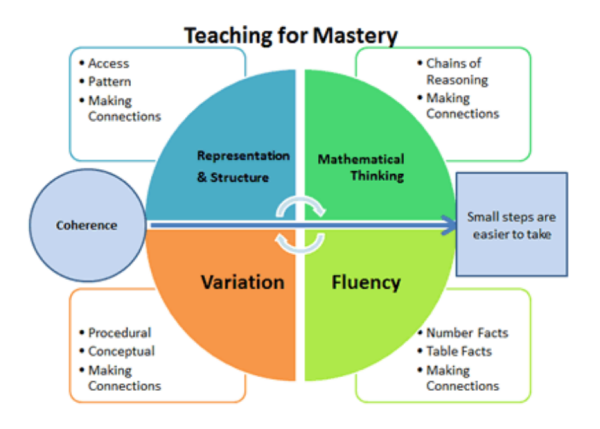Maths
At Abbey Farm ET, we believe that in maths the answer is just the beginning.
Maths is incredibly important in our lives and, without realising it, we use mathematical concepts, as well as the skills we learn from doing maths problems, every day. The laws of mathematics govern everything around us; maths nurtures qualities such as reasoning, creativity, abstract or spatial thinking, critical thinking, problem-solving abilities and effective communication skills. A solid grounding in maths equips a child with uniquely powerful ways to describe, analyse and change the world.
How maths is taught at Abbey Farm

We have adopted the ‘mastery’ approach to teaching maths. Mastering maths means pupils acquiring a deep, long-term, secure and adaptable understanding of the subject.
The phrase ‘teaching for mastery’ describes the elements of classroom practice and school organisation that combine to give pupils the best chances of mastering maths.
Achieving mastery means acquiring a solid enough understanding of the maths that’s been taught to enable pupils to move on to more advanced material.
Effective teaching for mastery is underpinned by five big ideas.
Coherence
Lessons are broken down into small, connected steps that gradually unfold the concept, providing access for all children and leading to a generalisation of the concept and the ability to apply the concept to a range of contexts.
Representation and Structure
Representations used in lessons expose the mathematical structure being taught, the aim being that students can do the maths without recourse to the representation.
Mathematical Thinking
If taught ideas are to be understood deeply, they must not merely be passively received but must be worked on by the student: thought about, reasoned with and discussed with others
Fluency
Quick and efficient recall of facts and procedures and the flexibility to move between different contexts and representations of mathematics. To increase fluency we have introduced Numbersense to year 1, which we are currently rolling out to year 2.
Variation
Variation is twofold. It is firstly about how the teacher represents the concept being taught, often in more than one way, to draw attention to critical aspects, and to develop deep and holistic understanding. It is also about the sequencing of the episodes, activities and exercises used within a lesson and follow up practice, paying attention to what is kept the same and what changes, to connect the mathematics and draw attention to mathematical relationships and structure.
Calculation Policy
Abbey Farm Educate Together is currently following the WhiteRose Maths Scheme in Year 1 and 2, alongside their calculation policy. This contains the written procedures that will be taught within our school alongside practical resources and is currently under review as we are looking at opening year 3. It ensures consistency and progression throughout the school and reflects a whole school agreement.
Schemes of work
Each year group follow a scheme of work when planning and delivering maths. We follow Whiterose Maths with adaptions for our cohorts of children.
During the academic year 2024-25 we are taking part in a trial that is being led by One Step Ahead (via EEF - Education Endowment Foundation). This project tests the impact of short and regular pre-teaching sessions on Year 1 and Year 2 pupils’ maths learning. ‘One Step Ahead’ is a ‘Teacher Choices’ project exploring the impact of different ways in which teachers can support Year 1 and Year 2 pupils in enhancing their maths skills and confidence. ‘One Step Ahead’ involves regular pre-teaching sessions conducted a few times a week before the main maths lesson. These sessions are conducted with small groups of 6 pupils identified by teachers as likely to benefit from additional support at a time, ensuring each child is adequately supported.
We have really enjoyed being part of this led research and are anticipating that it will provide up-to-date, accurate research on our teaching methods going forwards.
We have also been accepted on Maths Champions - Bespoke Early Years Maths Training - NDNA which will start in February 2025. We know that the closer we work with cutting edge research and expert knowledge then the more impactful we can be with our amazing children!
Parent/carer engagement
We recognise and place great importance on parent/carers engagement with their children’s mathematical development. We understand that the maths being taught can, on occasion, seem confusing or daunting and that the methods being used are occasionally unfamiliar. To address this a termly topic map is sent out that contains details of the children’s maths learning for the forthcoming term. We also hold workshops in which parents/carers will be able to find out more about the methods that they can use to support their children’s maths learning.
This year we ran parent/child maths clubs that allows us to showcase and demonstrate different methods whilst offering the opportunity to use school resources. This was funded and supported through Multiply SBC.




